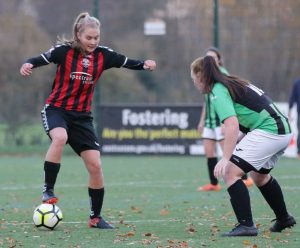Podcast: Play in new window | Download
Subscribe: Apple Podcasts | RSS
 We had our last league games of the fall season last weekend. It was great to see so much of what we had been working on come together in those games. We still have a lot to improve but we’re definitely headed in the right direction.
We had our last league games of the fall season last weekend. It was great to see so much of what we had been working on come together in those games. We still have a lot to improve but we’re definitely headed in the right direction.
I had an encounter with a parent from one of the teams we played against over the weekend. This kind of thing doesn’t happen often but I thought I’d share it in hopes that it might help someone else that is faced with this situation in the future. I won’t go into all of the detail hear but I discuss it on the podcast and I’d be interested to hear any feedback you have.
 Today’s question comes from Jerry. He has a couple of questions about development versus winning.
Today’s question comes from Jerry. He has a couple of questions about development versus winning.
Jerry says, “I like to think I’m more about development of the players. That said, this is a very complex issue, I’ll list some of the things I have been facing and which are causing me not to always give equal playing time.
– We have 3 players that aren’t nearly as good as the rest, big drop off…2 of them don’t put the time in at home (not asking a lot, just 20 minutes on days we don’t practice), and they miss a lot of practices. I just don’t feel its right to reward equal playing time to these 2 players. What would you do in this case?
– All clubs aren’t about putting the best players together on the same team like yours, where you promote deserving players up to higher level teams. Even though I coach the A team, there are some players on the B team that should be on the A team. Part of this is keeping friends together, something I get…at what point should a player move on to another club where they try to put the best players together on the same team? How does your club balance friendships and putting best teams possible together?
– I mentioned the 3 players above that aren’t nearly as good as my other players…they partly made the team due to politics at our club. How do you deal with that? I’ve heard politics affects all clubs even the top level ones (heard one parent said they would take their $20K donation away if their daughter didn’t make the team at a top level club in my area). What sort of politics have you faced and how do you deal with it?
– How do you balance parents desire to win versus development? I have some parents who really want to win, way too much. I get it in tournament championships if you make it that far or State Cup…but the rest shouldn’t matter.
How do you deal with these kind of parents.
Thanks for the question Jerry!
Below are the answers I shared in the comments section for Episode #162. I go into more detail on the podcast.
1) If they’re not good enough, I wouldn’t have placed them on my team. If they’re on my team, they play at lease 50% of each game.
2) Every parent has to do what’s best for their child. If playing with friends is the most important thing to the player then that’s what’s best for them. If they are driven to compete and develop then looking for a team with the best players is the right move.
3) We don’t place players with friends in our premier program. That’s what the recreational program is for.
4) I can honestly say that politics has nothing to do with our decisions at tryouts. Our Boy’s Director’s daughter was moved down two teams one year. We place players based on where they fit.
5) I don’t coach to the desires of the parents. There are times that the better players will get more playing time (everyone still gets 50%) but that’s a decision I make based on what I think is best for the team and players.
In This Episode
In this, the third of three episodes focused on training decision making, I describe how I approached my last training session focused on this topic. I’ll let you know how I planned it, how the session started and what adjustment I made as we went through it based on how the players performed.
Here’s the Diamond Shooting activity that I mentioned in this episode:
Future Episodes
I’m continuing to build my list of potential topics for the future. I haven’t decided on one for next week so if you have a suggestion I’d love to hear it.

Hey Tom – Sounds like you were caught in a losing situation. Without being contradictory: I want my players to be aggressive, competing for the ball, putting in challenges and getting into tussles all while playing the ball and without intentionally fouling their opponents, however the only time I get frustrated with the referee is when a game gets out of control and player safety becomes an issue. The thing I got thinking about as you told the story is about the fact that your team is playing up an age group and how this was a component of what lead to the problem (the size difference of older kids against younger kids). Unless you automatically have your top team at a certain age group play up I think it would be really interesting to hear how your club makes decisions about when you play an entire group of players up. For example what do you need to see from the players or are there other external factors that are taken into account and how often are teams from your club played up? Is it more frequent for boys vs. girls? I think this can be a very gray area, with strong opinions on opposing sides when an entire group of players is involved. I think making a decision for a single player is a different process, and maybe is more often seen in older age groups, where as whole teams playing up is more common at younger age groups.
I do not have any solutions for you other than to say if you were able to walk away from the parent without any yelling, screaming and cursing you did as much as could be expected.
Thanks for sharing the story.
Ted
Hey Ted,
I agree, I want my kids to play tough but fair. This is a phrase I use with them often. There’s no doubt that part of the issue was that we were a younger team playing up but the fouls weren’t hard tackles that just looked worse than they were because of the size differential. They clearly fouls that just weren’t being called.
I did a whole podcast on playing up. It was episode #99. I discussed playing up as an individual and as a team.
Thanks for taking the time to share your thoughts.
Hi Tom,
I love the 24 hour rule of no speaking with parents, otherwise nothing good can come if it.
I’ve just started listening to these podcasts after trying a few others. Yours are by far the best. Especially love that you’re not hard selling something!
I started with episode 1 and moved up through a bunch, and then just started skipping around looking to listen to just more generic coaching episodes rather than specific training ones. The reason is that I listen while commuting 30 minutes each way, so it’s too hard to listen to specific drill setups. Mind can’t do driving and visualization of a drill, lol.
I do wish that you’d provide specifics when discussing your practices. For example, you start with warm up games while the kids arrive. Are you giving kids pennies and separating them yourself or letting them decide? Or, How do you split up the team into 4v1 rondos when there is 14 kids, or 16, or only 12? It’s these minor sounding details that are oftentimes the things I wish I knew how others dealt with.
Thanks again!
Thanks for the suggestion Brian. I’ll try to add that detail in future episodes. If I ever leave something out that you’re interested in just let me know.
I usually allow the players to make the groups. At times I’ll put my stronger players together for an activity to challenge them but there isn’t a huge disparity between the top and bottom on my teams so letting the players do it works out fine most of the time.
I adjust the rondos to fit the number of players I have. If I have 14 I might jump on an play with one group and then switch with someone from each of the other groups so that I can see how those players are doing.
Tom, I love your podcast and am very glad to have found it after coming back to club coaching after 10 years away from the game.
I cam back to coach a U11 girls team of players new to club soccer. I completely agree that the refs are young and we should not be harsh to them. I have taught my players to talk to the ref if they have an issue on the field. My philosophy is that I am not on the field and can’t see or hear what the opponents saying or doing things they shouldn’t. What are your thoughts on this?
Lisa, Thanks for listening!
I tell my players to just play and let the officials referee the game.
If the players don’t understand something I may ask the referee after the game if I can’t explain it to them.